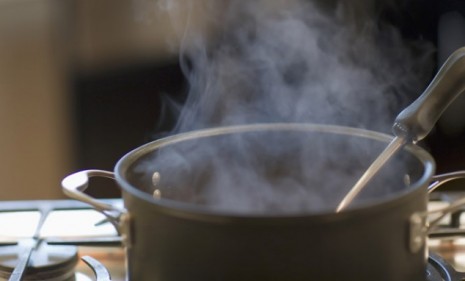Eating your own placenta: A ridiculous fad?
More and more mothers are reportedly chowing down on their afterbirth. They claim it has a variety of health benefits — while others say it's just gross

A free daily email with the biggest news stories of the day – and the best features from TheWeek.com
You are now subscribed
Your newsletter sign-up was successful
Talk about eating local. According to a new article in New York, the practice of new mothers eating their own placentas (a phenomenon that first surfaced in the 70s) is again becoming trendy— at least in Brooklyn. Placenta-eating advocates say the afterbirth is highly nutritious and that eating it can help with breast-feeding and postpartum depression. Is nibbling on placenta jerky or sipping on an afterbirth smoothie really worth it — or is this just a gross fad?
There's no proof this is helpful: While "proponents say eating one's own placenta can result in better moods, more successful breast-feeding, a reduced chance of postpartum depression and more energy," there's no research to support any of those claims, says KJ Dell Antonia at Slate. Placenta-eating advocates also note that "virtually every land mammal" eats their own placenta, but c'mon "many, if not most, land mammals also eat their infants' poop."
"A 'growing' number of women eat their own placentas. In Brooklyn."
The Week
Escape your echo chamber. Get the facts behind the news, plus analysis from multiple perspectives.

Sign up for The Week's Free Newsletters
From our morning news briefing to a weekly Good News Newsletter, get the best of The Week delivered directly to your inbox.
From our morning news briefing to a weekly Good News Newsletter, get the best of The Week delivered directly to your inbox.
And it's just disgusting: "Maybe I'm being a stereotypical male here, grossed out by the birth process and anything related to it," but I really wish this were all a joke, says Dan Gibson at Tucson Weekly. The whole trend really "freaks me out," and the very idea of eating a placenta makes me lose my appetite for anything. This is simply revolting.
"The New York magazine article on placentas freaks me out"
But it really works for some people: "The body follows the mind," says London King, a woman who describes herself as a "baby planner, doula, marriage counselor, and placenta lady," as quoted in New York. "If I drink a green drink and I think it's good for me, then that's great." The same is true for eating placentas. Even if the positive effects of eating her placenta are just in a woman's mind, the practice still has value. Plus, plenty of women have told me they have more energy and fewer breast-feeding problems after eating their placentas. "That's evidence enough for me."
A free daily email with the biggest news stories of the day – and the best features from TheWeek.com
-
 The ‘ravenous’ demand for Cornish minerals
The ‘ravenous’ demand for Cornish mineralsUnder the Radar Growing need for critical minerals to power tech has intensified ‘appetite’ for lithium, which could be a ‘huge boon’ for local economy
-
 Why are election experts taking Trump’s midterm threats seriously?
Why are election experts taking Trump’s midterm threats seriously?IN THE SPOTLIGHT As the president muses about polling place deployments and a centralized electoral system aimed at one-party control, lawmakers are taking this administration at its word
-
 ‘Restaurateurs have become millionaires’
‘Restaurateurs have become millionaires’Instant Opinion Opinion, comment and editorials of the day